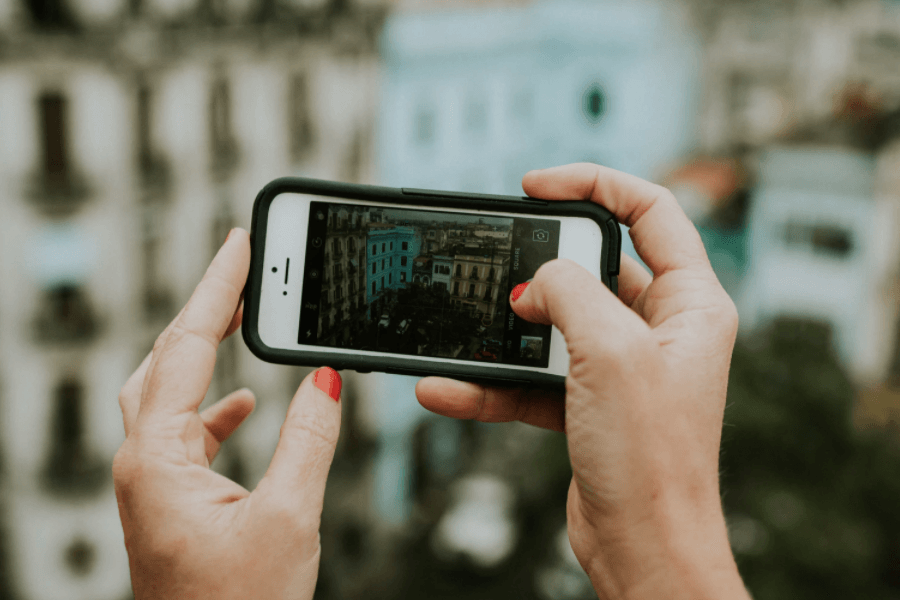Are You Smarter than a Smart Phone?

Cell phone dependency is taking over—Fight back!
All the Knowledge in the World
The capital of Denmark. He played right field for the 1984 San Diego Padres. She won an Oscar for Norma Rae.
If this was a bar bet and the words Copenhagen, Tony Gwynn, and Sally Field didn’t come out of your mouth, you’re buying drinks.
Chances are you’re wondering why you should know mindless trivia, especially when you carry something the size of a deck of cards that knows everything: your smart phone. What’s the point of remembering the capital of Montana when Google knows it’s Helena? Who cares how many times Frank Sinatra was married if your cellphone knows? And why in the world would you take time to memorize the bus schedule when you can look it up in an instant?
If you’re like most, your smart phone is completely integrated into your life. The average American spends 5.4 hours a day on their phone. We FaceTime, Snapchat, or Tweet almost a quarter of the day. And this number is increasing every year.
Today’s smart phones are incredible marvels of engineering. A standard smart phone is packed with technology: a built-in GPS, the capacity to send and receive emails and text messages, access to banking, and Candy Crush. Every song, podcast, movie, and video are available at the swipe of your finger. You can purchase anything from a pair of soccer cleats to a plane ticket in seconds.
Oh yeah, they also make phone calls.
Smart phones give you access to the internet and a world of apps. They’re incredibly powerful tools to find and process information. And for context, they’re only getting better. The average smart phone has over 120 million times the computing power than the navigation computer that landed men on the moon in 1969. And chances are you’re only using it for Lyft rides or late night Grubhub deliveries.

Cutting the Figurative Cord
The first cell phone was released in 1983. It was the size of a footlong sub sandwich, weighed two pounds, and had power for 30 minutes. It wasn’t until 1994 that IBM launched the first smart phone, the Simon Personal Communicator. It wasn’t perfect, but it did have most of the features we think of today: touch screen, QWERTY keyboard, email service, and even apps.
The iPhone revolutionized smart phones. Sleek and intuitive, it introduced millions to apps and the power of a smart phone. Specifically, the smart phone took the functionality of a desktop computer and made it mobile, opening up a world of possibilities for social media. Facebook and Twitter were launched in 2006 with Pinterest, Instagram, Tumblr, and other sites quickly following. In less than a decade, smart phones shrunk the world, bringing us into immediate contact with others.
Under the best circumstances, social media platforms can provide the opportunity for amazing experiences. With Facebook, you can reconnect with friends from high school or follow celebrities on Twitter. Instagram is fantastic for seeing the world through others’ eyes. But these experiences come at a cost. The smaller and the faster the world gets through smart phone technology, the more dependent we become on our phones. Considering we’re on our phone around five hours a day, it may be a good idea to set the phone to silent, or even turn it off every now and then.

Set to Airplane Mode
Chances are you’ve looked at your smart phone at least once reading this article. Totally normal, we all do it. It’s hard not to get distracted, and frankly, cell phones have a ton of cool things to stare at. So, what to do? Smart phones are a part of our lives and certainly not going away. The best thing is to set personal cell phone limits.
Start by limiting your screen time. As a rule of thumb, if you’re lying down, the smart phone shouldn’t be in your hand. Cell phones emit blue light, which can harm your sleep quality. The body’s pineal gland releases melatonin the closer you get to bedtime. Your cellphone’s blue light delays your naturally occurring melatonin and resets your body’s internal clock. Result: your cell phone is screwing up your sleep.
Here are some other easy tips to help cut back on your screen time:
- Lunch break. Eat your meals without a screen. You might want to ‘gram your meal, but try eating instead. It’ll give your eyes a rest, and you might actually strike up a conversation with your dining companion.
- Clock it. You don’t have to go cold turkey with your cell phone. Instead, set aside specific time during the day to log in to your favorite social platforms. Start by limiting the number of times you visit a site. Gradually shorten the time you spend during each session.
- Take a hike. Scrolling through Instagram is good to stave off boredom, but there are better ways. Find a hobby. Read a book. Scrapbook. Go for a jog. Your cell phone has tons of entertainment, but it shouldn’t be your primary source of fun.
- Old school Google. Before the world’s digital libraries were at your fingertips, there were, well…libraries. Yes, this is snarky, but cool things happen when you look for alternative sources for information. If you’re looking for new recipes or instructions for origami, head to the library or check out your own collection of books for the answer.
- Bedrooms are for sleeping. Don’t charge your cell phone in the bedroom. Not only are you limiting the amount of blue light from arm’s reach, you’ll be less tempted to wake up in the middle of the night and check your phone.

Putting the Smart in Phone
Okay, we get it. It’s going to be difficult to put down your smart phone. How about using it for something that can actually make you smarter or more productive. If you’re going to be staring at your phone while waiting for coffee or flying cross-country, let’s multitask this sucker.
Here are some apps that both entertain and educate.
- Duolingo. Learning a new language is a great way to boost your cognitive power. Duolingo combines reading, writing, listening, and speaking exercises to help you understand one of 13 languages. Research suggests learning a new language can help delay cognitive decline as we age.
- Kindle. Reading helps with emotional intelligence and your capacity for empathy. With Kindle, you have access to almost every book in the Western canon at your fingertips. Read to your heart’s content as you strengthen your mind and learn about an array of subjects.
- Longform. The very best of longform articles culled from the very best sources are waiting for you at the aforementioned Longform.com. From true crime to science, short fiction to stories of adventure, Longform brings the best long writing together. It’s perfect while waiting for the train or to entertain at lunch.
- GarageBand. Playing an instrument is a great way to keep your mind sharp. The GarageBand app for iOS has a collection of instruments you can noddle with to create the next great electronic hit. Music can inspire and help with problem-solving abilities.
- TED. They’re the talks that people want to talk about. The very best leaders in every conceivable industry give TED talks. Science, business leadership, creativity, and inspiration can all be found on TED.
- Lumosity. Games are great to get your brain working. They offer daily word challenges, memory matrixes, and 60 other cognitive games. Find your baseline and try and improve your thinking game with 10-minute workouts.
It’s a Tool, Not a Toy
There isn’t a device as versatile as a smart phone. Your ability to communicate with the world is limitless. You have untethered exposure to information, news, entertainment, and platforms to improve your life. The design ergonomics fits cleanly in your hand and you can see the world through the lens of your smart phone’s camera.
They can also be an incredible time suck.
Treat your smart phone as a tool to improve your life. Use it as a fitness tracker, a digital record of family and friends, or as a way to challenge yourself. There are apps to make doctor appointments, set up businesses, and yes, play Angry Birds. Like everything in life, don’t do anything to excess. Make sure to put limits on the time you dedicate to staring at a screen.


Leave a Reply
Want to join the discussion?Feel free to contribute!